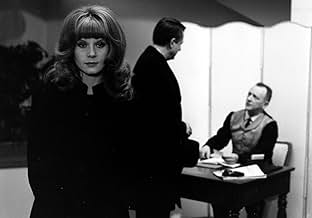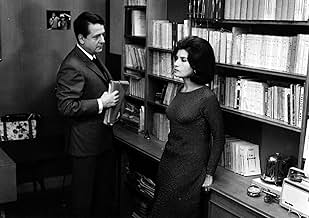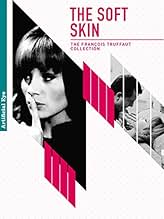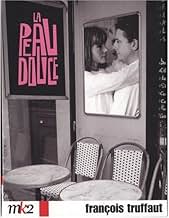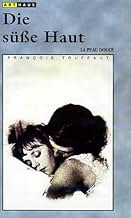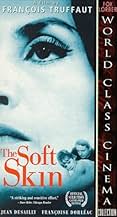IMDb-BEWERTUNG
7,5/10
8848
IHRE BEWERTUNG
Pierre Lachenay ist ein bekannter Verleger und Dozent, verheiratet mit Franca und Vater von Sabine, um die 10 Jahre alt. Dann lernt er die Stewardess Nicole kennen.Pierre Lachenay ist ein bekannter Verleger und Dozent, verheiratet mit Franca und Vater von Sabine, um die 10 Jahre alt. Dann lernt er die Stewardess Nicole kennen.Pierre Lachenay ist ein bekannter Verleger und Dozent, verheiratet mit Franca und Vater von Sabine, um die 10 Jahre alt. Dann lernt er die Stewardess Nicole kennen.
- Regie
- Drehbuch
- Hauptbesetzung
- Auszeichnungen
- 1 Gewinn & 2 Nominierungen insgesamt
Françoise Dorléac
- Nicole
- (as Françoise Dorleac)
Carnero
- Lisbon organizer
- (Nicht genannt)
Georges de Givray
- Le père de Nicole
- (Nicht genannt)
Catherine-Isabelle Duport
- Jeune fille Reims
- (Nicht genannt)
Maximiliènne Harlaut
- Mme. Leloix
- (Nicht genannt)
Charles Lavialle
- Veilleur hôtel Michelet
- (Nicht genannt)
Empfohlene Bewertungen
Truffaut's study of a middle-aged man losing his way in life in the age-old fashion is caught in a mesmerizing series of quick-succession shots and sympathetically-captured quotidian details. An unthinking, self-assured man; his wounded, passionate wife; his sweet, vulnerable lover; an inevitable tragedy. This underrated film has no real surprises, but its sure-footedness is impressive and the simple story ultimately very moving.
Truffaut filmed La Peau Douce immediately after the international success of "Jules et Jim". Released at the heyday of the nouvelle vague, critics and audiences panned the film as a futile resort to bourgeois classicism after the unconventional antics of his previous masterwork.
They could not have been more mistaken. Time has treated La Peau Douce better than most of his later efforts. It is definitely a triumph of direction with each scene being carefully planned and meticulously structured, not unlike a Hitchcock movie. In practice, Truffaut transposes Hitchcock's mechanisms of suspense into a seemingly trivial story concerning the illicit love affair of a distinguished editor/author with a younger stewardess and its withering consequences. The characters and the milieu of the story are effortless evoked, but the main joy is derived from the visual inventiveness that Truffaut shows in scene after scene. It's a triumph of a purely cinematic mode of expression, which Truffaut was one of the few who had really mastered it.
They could not have been more mistaken. Time has treated La Peau Douce better than most of his later efforts. It is definitely a triumph of direction with each scene being carefully planned and meticulously structured, not unlike a Hitchcock movie. In practice, Truffaut transposes Hitchcock's mechanisms of suspense into a seemingly trivial story concerning the illicit love affair of a distinguished editor/author with a younger stewardess and its withering consequences. The characters and the milieu of the story are effortless evoked, but the main joy is derived from the visual inventiveness that Truffaut shows in scene after scene. It's a triumph of a purely cinematic mode of expression, which Truffaut was one of the few who had really mastered it.
On a business trip to Lisbon you're distracted, by a stewardess you find rather attractive, so you take a chance and call, as she's staying down the hall, it's a tangent that will mean, your life's refracted. You're consumed with all the flushes of desire, she's igniting all the flames your wife cant fire, but opportunities to meet, while remaining quite discreet, when back in Paris, leaves you shackled in the mire. A business trip to Reims provides a chance, to take Nicole, and to enjoy some more romance, get some privacy at last, break your circumstantial fast, though best laid plans may leave you looking more askance.
A well-known publisher has an affair that delivers considerably more than he bargained for. Great performances and original for its time.
A well-known publisher has an affair that delivers considerably more than he bargained for. Great performances and original for its time.
This Truffaut is more old cinema than new wave:Jean Desailly is unusual in ""Jules et Jim" director's universe.He's certainly one of the greatest French actors I know but he's better with Jean Delannoy or Edouard Molinaro.Truffaut's touch is here anyway:you can feel it thru the father/daughter relationship,during the scene when Desailly brings a classical music record to his little girl .The breakfast trail which the cat finds on this way will be here again in "la nuit américaine " (day for night).A lot of details show the cine buff Truffaut was,notably the restaurant called "la Colinière" the name of the mansion in Jean Renoir's "la règle du jeu";the room 813 is probably a nod to Maurice Leblanc and Arsène Lupin.
The love triangle would have been be trite,had not Truffaut focused on the cheated wife (Nelly Benedetti) ,an offbeat move.The end of the movie is hers ,at the expense of the late Françoise Dorleac's pretty girl character.And the scene in the street with the man who treats her like a whore is woman's lib before its time:"who do you think you are?take a good look at yourself! " this desperate woman screams.And the harsh conclusion heralds that of "la mariée était en noir" (the bride wore black).�
The love triangle would have been be trite,had not Truffaut focused on the cheated wife (Nelly Benedetti) ,an offbeat move.The end of the movie is hers ,at the expense of the late Françoise Dorleac's pretty girl character.And the scene in the street with the man who treats her like a whore is woman's lib before its time:"who do you think you are?take a good look at yourself! " this desperate woman screams.And the harsh conclusion heralds that of "la mariée était en noir" (the bride wore black).�
French drama from writer-director Francois Truffaut. A respected author and lecturer (Jean Desailly) has an affair with a young stewardess (Francoise Dorleac).
I believe this film is deeply personal for Truffaut. He has several films about male protagonists who cheat on their wives or girlfriends (Bed and Board and The Man Who Loved Women, for example). What I like best about The Soft Skin is precisely that the affair happens because the stewardess is impressed to get involved with a minor celebrity, and he sleeps with her mainly because he can. They don't "fall in love" with each other; it's an adultery story, not a love story. Because the emotional involvement of the characters isn't very great, neither is the involvement of most of the audience. I will infer that Truffaut had more than one fling like this, but had no insight into why he did this. The subject is personal, but nothing about the presentation helped to alleviate that paucity of engagement.
Two other points: 1) Truffaut's films tend to be very one-paced. They don't usually quicken, slow down, speed up, etc. They proceed pretty much at the same pace from beginning to end. This is a real limitation. 2) I have come to believe that as much as Truffaut loved Hitchcock's films, as a director he learned absolutely nothing from him. Hitchcock is a master of pacing. The best moments in Truffaut's films usually come from a realist aesthetic that is the opposite of Hitchcock's master manipulation of genre and audience.
I believe this film is deeply personal for Truffaut. He has several films about male protagonists who cheat on their wives or girlfriends (Bed and Board and The Man Who Loved Women, for example). What I like best about The Soft Skin is precisely that the affair happens because the stewardess is impressed to get involved with a minor celebrity, and he sleeps with her mainly because he can. They don't "fall in love" with each other; it's an adultery story, not a love story. Because the emotional involvement of the characters isn't very great, neither is the involvement of most of the audience. I will infer that Truffaut had more than one fling like this, but had no insight into why he did this. The subject is personal, but nothing about the presentation helped to alleviate that paucity of engagement.
Two other points: 1) Truffaut's films tend to be very one-paced. They don't usually quicken, slow down, speed up, etc. They proceed pretty much at the same pace from beginning to end. This is a real limitation. 2) I have come to believe that as much as Truffaut loved Hitchcock's films, as a director he learned absolutely nothing from him. Hitchcock is a master of pacing. The best moments in Truffaut's films usually come from a realist aesthetic that is the opposite of Hitchcock's master manipulation of genre and audience.
Wusstest du schon
- WissenswertesThe scenes set in Pierre Lachenay's apartment were filmed in Truffaut's own home.
- PatzerPierre and Nicole are in a hotel elevator approaching the 8th floor, Pierre is on the right side. The following shot from outside the elevator shows Pierre on the opposite side.
- Zitate
Pierre Lachenay: I've learned that men's unhappiness arises from the inability to stay quietly in their own room.
- VerbindungenFeatured in François Truffaut: Portraits volés (1993)
- SoundtracksPierre Et Nicole
Written and Performed by Georges Delerue Et Son Orchestre
Top-Auswahl
Melde dich zum Bewerten an und greife auf die Watchlist für personalisierte Empfehlungen zu.
- How long is The Soft Skin?Powered by Alexa
Details
- Erscheinungsdatum
- Herkunftsland
- Sprachen
- Auch bekannt als
- The Soft Skin
- Drehorte
- Produktionsfirmen
- Weitere beteiligte Unternehmen bei IMDbPro anzeigen
Box Office
- Bruttoertrag in den USA und Kanada
- 509 $
- Eröffnungswochenende in den USA und in Kanada
- 11.206 $
- 25. Apr. 1999
- Weltweiter Bruttoertrag
- 35.501 $
- Laufzeit1 Stunde 53 Minuten
- Farbe
- Sound-Mix
- Seitenverhältnis
- 1.66 : 1
Zu dieser Seite beitragen
Bearbeitung vorschlagen oder fehlenden Inhalt hinzufügen


![Bande-annonce [OV] ansehen](https://m.media-amazon.com/images/M/MV5BYzY4NmVmYjItNzQ2MS00MDU4LThlODctYjliMTRhM2ZmY2MwXkEyXkFqcGdeQXRyYW5zY29kZS13b3JrZmxvdw@@._V1_QL75_UX500_CR0)
